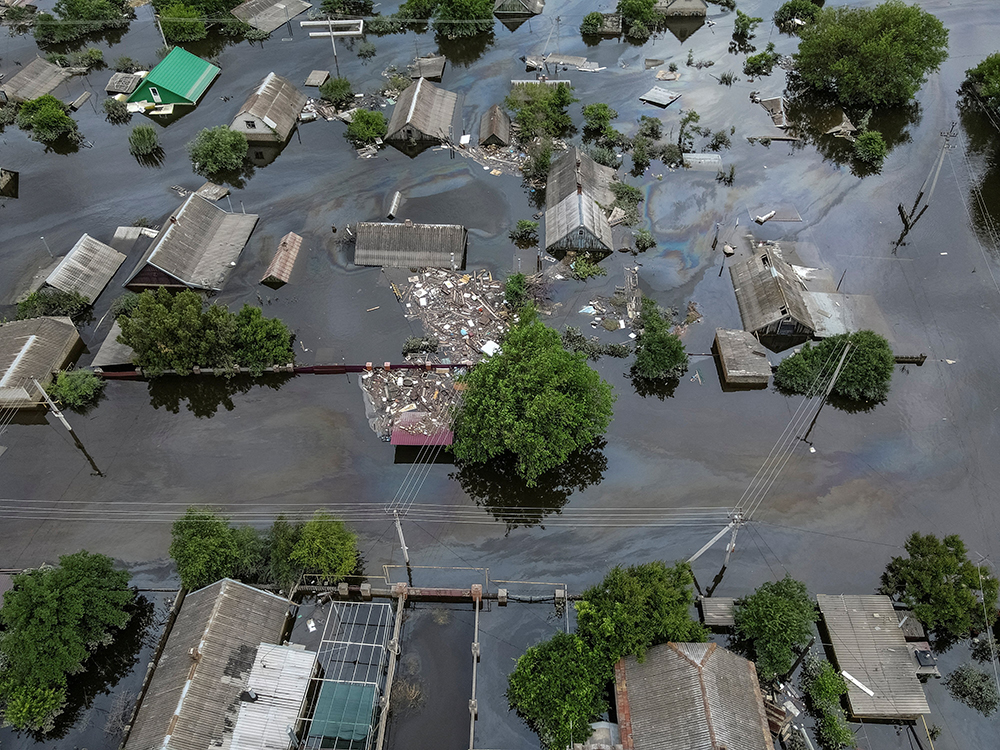
By Paulina Guzik and Gina Christian
(OSV News) — Delivering aid in Ukraine’s flooded Kherson area has become a life-threatening task. Aid workers with Caritas and other organizations told OSV News they cannot go on rescue boats without wearing bulletproof vests and military helmets, as Russian troops have continued to fire on civilian victims and rescuers.
In some towns that are still under Russian occupation, sources say the situation is so dire that people die on their own rooftops.
On June 6, damage to the Kakhovka Hydroelectric Power Plant in Kherson released some 4.3 cubic miles of water (a single cubic mile of water equals 1.1 trillion gallons) from the Kakhovka Reservoir, one of the world’s largest capacity reservoirs. Dozens of towns and villages along the Dnipro River have been flooded so far, with tens of thousands at flood risk, according to Ukrainian government officials.
Over 80 settlements were in the path of the surging waters, which have swept away entire houses and structures, killing at least 10 individuals, according to Ukrainska Pravda, an online news outlet, as well as hundreds of animals — including all but a few of the 300 in residence at the Kazkova Dibrova zoo. Casualties may rise since there is little information on the situation of the Russian-occupied side of the river. The U.S. Embassy in Russia said that in Kherson 43 others have been injured and 27 were still missing as of June 13.
The International Organization for Migration estimates more than 700,000 are expected to face water shortages. With the flood waters sweeping away industrial chemicals, sewage, human and animal corpses, the World Health Organization said the impact of the dam’s destruction “cannot be underestimated.”
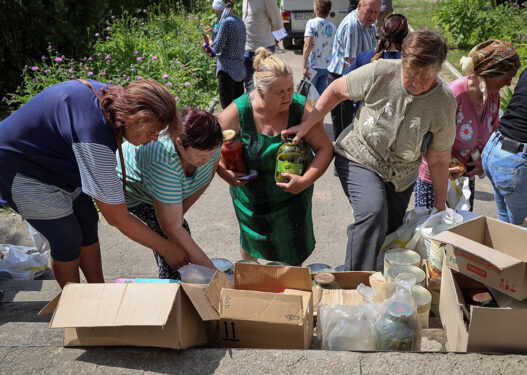
While international media reports have steered clear of identifying a definitive cause or responsible party for the destruction, the nonprofit Institute for the Study of War, based in Washington, reported June 6 that absent a “definitive assessment of responsibility … the balance of evidence, reasoning, and rhetoric suggests that the Russians deliberately damaged the dam,” which Russian forces overtook in February 2022.
Father Piotr Rosochacki, director of Caritas-Spes Ukraine, told OSV News that while “the water is slowly, very slowly falling … unfortunately it flows along with entire houses.”
“Remember, this area is rural and very poor, and a lot of the houses didn’t even have foundations, so they get carried away by the water,” said Father Rosochacki, who joined Caritas in 2015 when his pastoral permit in Russian-occupied Crimea, where he had worked as a pastor in Simferopol since 2007, was not renewed.
“We are in great need of rubber gloves, rain boots, water pumps and equipment to dry out the buildings. People are really left with absolutely nothing here. Everything is under water, up to their roofs,” he said.
“We are aware that we can have a cholera outbreak here, and we have to take it into consideration when delivering humanitarian aid.”
Even more disturbing for the Caritas-Spes team is the constant shelling and artillery fire from the Russian-occupied side of the Dnipro River.
“Those terrains are regularly shelled. It’s not that Russia flooded the region and left them alone, no, it’s never ending!” Father Rosochacki lamented.
“What really struck me the other day is that one family we evacuated said, after losing their house to the flood, ‘better water then Russians,’ which only gives us the sense of what the occupation meant for them,” he said.
Kherson was liberated from Russian occupation in November 2022, but the left bank of Dnipro River is still under Russian control. Delivering humanitarian aid to the Russian side is close to impossible.
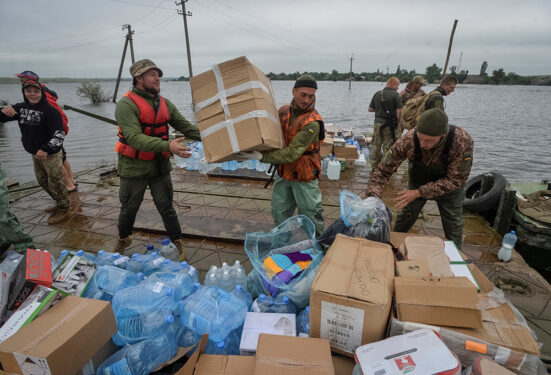
In an anonymous message obtained by OSV News, a Polish nun serving in Ukraine begged her Polish superior to pray for people who were “left to die” on the rooftops of houses in flooded areas under Russian occupation.
“Our Beloved Mother, with this short message I would like to ask you sincerely for prayer,” she said with her voice trembling and close to tears. “I got the message from one lady from the region where the Russians blew the dam — from Oleshky village — the left bank is occupied and the Russians did not let the people evacuate,” she lamented.
“People are sitting on rooftops, elderly, disabled, children, and the lady said in tears that they start to die there, and there is no help in sight,” she said.
“Please pray for mercy,” she begged.
“We know pretty much nothing happens in terms of evacuation on the left bank,” Father Rosochacki said. “In the first days of flooding people went up to the roofs. Temperatures were really high, but we couldn’t deliver water as we would be shot at, so we delivered water with drones to individuals sheltering there.”
“Russian forces are making the evacuation difficult in many ways, we have reports that they would only evacuate those who agreed to have a Russian passport, or give a bribe. Now connecting with the left bank is even difficult as there is no internet connection,” the priest said.
MIlitary equipment worn by aid workers has become an everyday outfit.
“We can’t go out to rescue people from flooded areas without the bulletproof jackets and helmets,” Father Rosochacki told OSV News. “At the beginning of the war it seemed strange to me that as a humanitarian organization I have to be around in this equipment, but really without it we risk the lives of our volunteers,” he added.
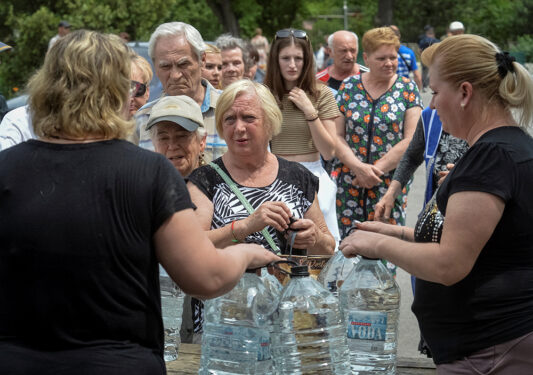
In a recent wave of attacks on Odessa, Kryvyi Rih and Kyiv were targeted with a rain of Russian missiles.
“It is deliberate,” Father Rosochacki told OSV News. “Russians want to achieve the effect of Ukrainians being busy with trying to survive attacks in other places and leaving the region of the damaged dam without help. But we won’t let go, we will help them.”
Father Rosochacki added that he is amazed at the solidarity of the people. “We don’t work only with the hands of our staff and volunteers. Local people have been accompanying us from day one.”
The danger is not only shelling but deadly surprises inside the water. “Those flooded terrains were mined by Russians earlier. So in everything that the flood waters carried, there can be landmines,” he said. “Cleaning is simply dangerous.”
“And on top of that, Russian occupiers stole the farm equipment earlier from the people,” he said, “so even in areas close to the flooding there is not a single tractor to pull and clean all those things carried by the waters.”
“Everything is carried by those waters to Odessa, to the Black Sea. So on Monday (June 12) we got the news that a partially built hotel was carried over there, but cleaning this is forbidden, it’s too dangerous. We are aware this is only the beginning of counting the losses,” the Caritas-Spes director added.
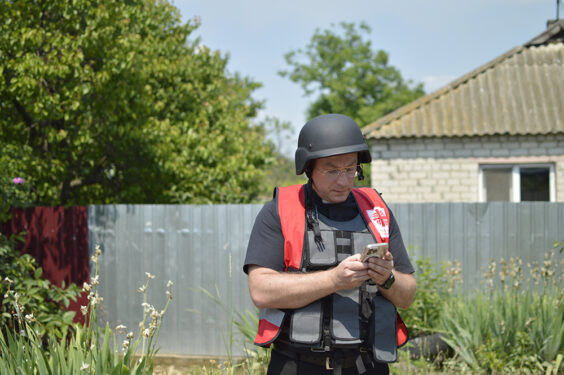
The Ukrainian Nature and Conservation Group said in a report that concerns are mounting for the Black Sea marine ecosystem. “The discharge of such a large amount of fresh water may temporarily desalinate certain areas of the Black Sea,” the group said, although “this impact is unlikely to have catastrophic consequences.” What threatens the marine ecosystem most is “entry of a significant amount of fuel and lubricants into the water, which are toxic to aquatic organisms and can form a film on the water surface.”
Forestry resources also may suffer, the group said. “The scale of destruction of wildlife, natural ecosystems, and entire national parks is incomparably greater than the consequences for the wilderness of all military operations since the start of the full-scale invasion in February 2022.”
Father Rosochacki appealed to Catholics around the globe not to forget about Ukraine, and not to become indifferent.
“The water will go away and in a month, two, others will live their own lives and forget about the dam. But people here will remain without basics like drinking water. Help needs to become long-term, so that those people can live again,” he said.
